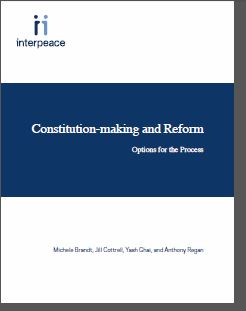Handbook: Constitution-making and Reform - Options for the Process, Interpeace - 2011

Following a revolution or violent conflict, developing a new constitution, or reforming an existing one, is full of pitfalls and challenges. If lasting peace is the ultimate objective, the process to get there can become as important as the content of the constitution itself.
As part of Interpeace’s "Constitution-making for Peace" programme the handbook "Constitution-making and Reform: Options for the Process" was published in 2011 and avaiable also in Arabic.
If you are a citizen wishing to engage, a civil society representative, a government representative, a national or international advisor, the handbook highlights key stages in the process. There is no one-size fits all approaches, so the handbook includes what to keep in mind, which decisions are key, the potential positive and negative consequences of those decisions, as well as practical tips to navigate the delicate process.
The handbook is the product of over five years of work. Four leading authors who have worked on over 30 different constitution processes contributed to the content. The handbook lays out the options to create a modern constitution that is legitimate in the eyes of the people and that has been developed through an inclusive process.
The stakes are high. If constitution-makers get it wrong, this may seed future conflict. But if they get the process right, the constitution can provide the foundation for lasting peace.
"I wish 'Constitution-making and reform: options for the process' had been available to the international community when I was the Special Representative of the UN Secretary-General for Afghanistan. This book asks the right questions."
Lakhdar Brahimi - Former Foreign Minister of Algeria and Special Representative of the UN Secretary-General to South Africa, Haiti, Afghanistan and Iraq